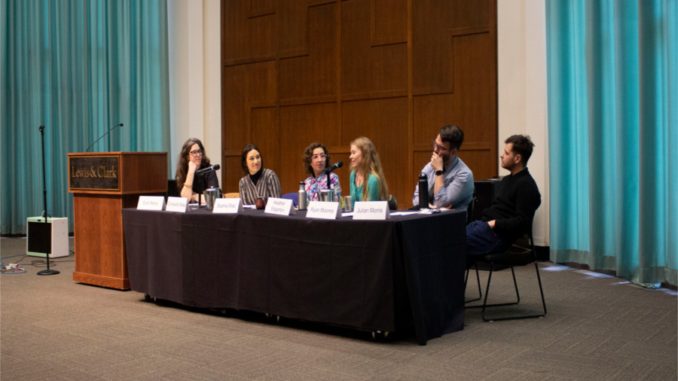
This year’s Gender Studies Symposium titled “Who Cares?” focused on the practices, applications and personal depictions of care. There was an immense variety of lectures, panels, and presentations that catered to the broad nature of the theme. Involving multiple student organizations and acclaimed speakers, the symposium proceeded from March 13 to 15. In discussing the diverse ways in which care is practiced, replicated and stigmatized, this annual event cultivated a space in which people could evaluate the intersection of care, gender, politics and other topics.
From student-designed workshops to academic lectures, a host of people participated in the symposium events. Symposiums like these often allow professors, students and others to cross disciplinary boundaries and explore topics that may be typically absent from their respective fields of study.
Nicole Lewis ’21 contributed two of her poems to the Gender Studies Art Show this year. She elaborated on the necessity of self-expression as a cathartic release to give voice to her experiences with trauma.
“I never really intended anyone to see these poems besides myself,” Lewis said. “But this was a good way for me to process these experiences. It’s helped me become a stronger person. Other people reading my words and having it on the wall has been a big ‘fuck you’ to the person who caused me this pain.”
Lewis also mentioned that she submitted her art as a way to stimulate community conversation about stigmatized topics.
“It’s really validating to see people read it and come up to me and say ‘that was really important’ and ‘your story needed to be shared,’” Lewis said. “It has been such a positive experience for me because people have told me, ‘Your words are really important.’ And that is exactly what I wanted from this. It’s about de-stigmatizing the conversation about rape and in finding some sort of collective comradery that doesn’t make you feel as isolated.”
Additionally, the Watzek library staff actively participates in the symposium through a collaborative Special Collections exhibit, which works with students who curate, write, and design the exhibit around the symposium’s central topic. Associate head of Special Collections and College Archivist Zachariah Selley participated on a panel called “Tracing Healthcare Throughout History.” His talk specifically focused on Dr. Alan Hart, the first transgender person to undergo a female to male sex change in America.
“I came to the Gender Studies Symposium this year through Zoe Maughan who is one of the chairs and happens to work in Special Collections,” Selley said. “Talking with her made me think of Dr. Hart and how his work fit both into the theme of health care, but also gender identity and its perception in early 20th century medical practice. He worked in the medical field, he’s become this kind of icon of the LGBTQ+ community. But he has always been misunderstood in a way. And I felt like it might be an opportunity to clear some of that up.”
Megan Glavin ’19 served as one of the three co-chairs for this year’s symposium. She discussed how the subject of care came to be the focus for the symposium and some of the logistical work and research that went into planning and organizing an event of this magnitude.
“We have a follow-up meeting after each symposium,” Glavin said. “Last year’s theme was insecurity, and in the follow-up meeting the idea of love was posed as a potential theme. But that idea transformed into this idea of care and in caring in response to both the themes that were talked about in last year’s symposium and in taking it forward and looking at the ways it’s enacted. We spend the summer choosing keynotes and sending out invitations and crafting a summary of what we want the symposium to capture and then sending out a call for proposals. In the fall and the spring the research continues, and we consider things that we want to be apart of the symposium that we didn’t receive proposals for. For example, we wanted to involve STEM this year so we created a round table on STEM.”
Glavin also commented on the inclusion of a fundraiser in the symposium that supported the Yolanda project, which helps local survivors of domestic violence find suitable lodging for themselves and their families.
“Last year was the first year we did a fundraiser, and we continued that this year,” Glavin said. “I hope that will continue because logistically it’s not too difficult to figure out, and each year we raise a significant amount of money.” The symposium concluded with a keynote presentation by renowned author of Bluets Maggie Nelson on Friday. The Special Collections exhibit will remain on display on the third floor of Watzek Library near Dr. Hannah Crumme’s office until the end of the semester.
Subscribe to the Mossy Log Newsletter
Stay up to date with the goings-on at Lewis & Clark! Get the top stories or your favorite section delivered to your inbox whenever we release a new issue.

Leave a Reply